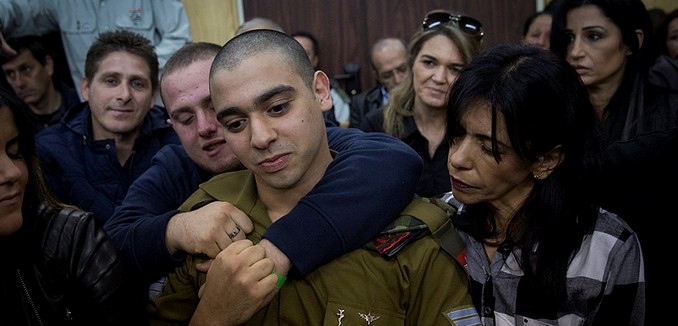A Israeli military court found a soldier who fatally shot an incapacitated Palestinian attacker guilty of manslaughter on Wednesday.
A panel of three judges delivered the verdict against Sgt. Elor Azaria, 19, who shot Abdel Fattah al-Sharif around 15 minutes after al-Sharif was seriously wounded while trying to stab an Israeli soldier in Hebron last March.
The judges rejected the defense’s claim that Azaria had acted on the belief that al-Sharif posed a threat to his comrades, and called his testimony, which changed over the course of the trial, “problematic” and “unreliable.”
“There is no grounds for the claim of self-defense,” said Judge Maya Heller, who presented the panel’s unanimous decision. “Azaria’s shooting was unjustified.”
“The fact that the man sprawled on the ground was a terrorist, who had just sought to take the lives of IDF soldiers at the scene, does not in itself justify disproportionate action,” Heller explained.
Sentencing will take place at a later date. Manslaughter carries a maximum sentence of 20 years, though the defense has vowed to appeal the ruling.
Defense Minister Avigdor Liberman called the verdict “very difficult,” adding, “A verdict has been delivered. Even those, like myself, who like the verdict less, must accept and respect it.”
Opposition leader Isaac Herzog stated that the verdict reflects the IDF’s commitment to its code of ethics. “I want to strengthen the hand of [IDF] Chief of Staff Eisenkot, who has been steadfast to the IDF’s values,” Herzog said.
MK Shelly Yachimovich, the former leader of the Labor Party, added that the court conducted itself “professionally and courageously.”
A sidenote, now that Azaria was found guilty. Love it or hate it, the entire process showed that Israel's legal system works.
— Gidon Shaviv (@GidonShaviv) January 4, 2017
What differentiates #Israel from all our neighbours? Quite simply, we have an independent Judiciary & the Rule of Law! #Azaria #Hebron https://t.co/OxFhR4pzkL
— Arsen Ostrovsky (@Ostrov_A) January 4, 2017
1. Israeli soldier found guilty for shooting an incapacitated Palestinian terrorists. When will we ask the same standards of Palestinians?
— Julie Lenarz (@MsJulieLenarz) January 4, 2017
Writing in The Tower in April, Eylon Aslan-Levy explained the trial’s significance in Israeli society:
Israel also has a pressing strategic interest not only that justice be done, but that it be seen to be done, independently, without international pressure. Israel must be seen to urgently prosecute violations of international law in order to preclude any attempt by the International Criminal Court to claim jurisdiction. Indeed, the killing of somebody hors de combat is considered a grave breach of the Geneva Conventions and thus a prosecutable war crime in the ICC’s eyes.
If the Palestinian Authority presses action against Israel in the International Criminal Court, Israel’s ability to show that it is “already investigating or prosecuting” those crime could undermine the Palestinian claims.
After the shooting, Dan Feferman provided context for the IDF’s standards of use of force during the wave of terror that began in September 2015:
The IDF is known to be relatively self-restraining in its rules of engagement, at least compared to other modern militaries fighting Low Intensity Conflicts, of which terrorism is one manifestation. A look at the number of recent terrorist attacks and the corresponding number of Palestinian deaths can illustrate this. There have been 211 stabbing attacks, 83 shootings, and 42 vehicular attacks between October 2015 and March 2016. This means that of the 336 total attacks, 23 of which involved two or even three terrorists, Israeli security forces have killed about 130 terrorists during or immediately after the act.
Militaries and police forces have the duty and responsibility to neutralize threats. If an assailant is downed without being killed, and is clearly no longer a threat, he or she is then to be kept alive, protected, and treated medically if necessary. The IDF’s record shows that this has mostly been the case.
UPDATE: Israeli Prime Minister Benjamin Netanyahu announced Wednesday afternoon that he is in favor of pardoning Azaria. The power to pardon criminals is vested in Israeli President Reuven Rivlin.
[ Photo: Miriam Alster / FLASH90 ]




